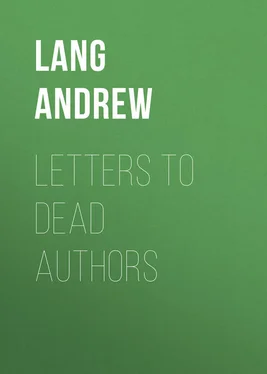Andrew Lang - Letters to Dead Authors
Здесь есть возможность читать онлайн «Andrew Lang - Letters to Dead Authors» — ознакомительный отрывок электронной книги совершенно бесплатно, а после прочтения отрывка купить полную версию. В некоторых случаях можно слушать аудио, скачать через торрент в формате fb2 и присутствует краткое содержание. Жанр: foreign_antique, foreign_prose, на английском языке. Описание произведения, (предисловие) а так же отзывы посетителей доступны на портале библиотеки ЛибКат.
- Название:Letters to Dead Authors
- Автор:
- Жанр:
- Год:неизвестен
- ISBN:нет данных
- Рейтинг книги:4 / 5. Голосов: 1
-
Избранное:Добавить в избранное
- Отзывы:
-
Ваша оценка:
- 80
- 1
- 2
- 3
- 4
- 5
Letters to Dead Authors: краткое содержание, описание и аннотация
Предлагаем к чтению аннотацию, описание, краткое содержание или предисловие (зависит от того, что написал сам автор книги «Letters to Dead Authors»). Если вы не нашли необходимую информацию о книге — напишите в комментариях, мы постараемся отыскать её.
Letters to Dead Authors — читать онлайн ознакомительный отрывок
Ниже представлен текст книги, разбитый по страницам. Система сохранения места последней прочитанной страницы, позволяет с удобством читать онлайн бесплатно книгу «Letters to Dead Authors», без необходимости каждый раз заново искать на чём Вы остановились. Поставьте закладку, и сможете в любой момент перейти на страницу, на которой закончили чтение.
Интервал:
Закладка:
When an author deliberately sits down and says, “Now, let us have a good cry,” he poisons the wells of sensibility and chokes, at least in many breasts, the fountain of tears. Out of “Dombey and Son” there is little we care to remember except the deathless Mr. Toots; just as we forget the melodramatics of “Martin Chuzzlewit.” I have read in that book a score of times; I never see it but I revel in it – in Pecksniff, and Mrs. Gamp, and the Americans. But what the plot is all about, what Jonas did, what Montagu Tigg had to make in the matter, what all the pictures with plenty of shading illustrate, I have never been able to comprehend. In the same way, one of your most thorough-going admirers has allowed (in the licence of private conversation) that “Ralph Nickleby and Monk are too steep;” and probably a cultivated taste will always find them a little precipitous.
“Too steep:” – the slang expresses that defect of an ardent genius, carried above itself, and out of the air we breathe, both in its grotesque and in its gloomy imaginations. To force the note, to press fantasy too hard, to deepen the gloom with black over the indigo, that was the failing which proved you mortal. To take an instance in little: when Pip went to Mr. Pumblechook’s, the boy thought the seedsman “a very happy man to have so many little drawers in his shop.” The reflection is thoroughly boyish; but then you add, “I wondered whether the flower-seeds and bulbs ever wanted of a fine day to break out of those jails and bloom.” That is not boyish at all; that is the hard-driven, jaded literary fancy at work.
“So we arraign her; but she,” the Genius of Charles Dickens, how brilliant, how kindly, how beneficent she is! dwelling by a fountain of laughter imperishable; though there is something of an alien salt in the neighbouring fountain of tears. How poor the world of fancy would be, how “dispeopled of her dreams,” if, in some ruin of the social system, the books of Dickens were lost; and if The Dodger, and Charley Bates, and Mr. Crinkle, and Miss Squeers and Sam Weller, and Mrs. Gamp, and Dick Swiveller were to perish, or to vanish with Menander’s men and women! We cannot think of our world without them; and, children of dreams as they are, they seem more essential than great statesmen, artists, soldiers, who have actually worn flesh and blood, ribbons and orders, gowns and uniforms. May we not almost welcome “Free Education”? for every Englishman who can read, unless he be an Ass, is a reader the more for you.
P.S. – Alas, how strangely are we tempered, and how strong is the national bias! I have been saying things of you that I would not hear an enemy say. When I read, in the criticism of an American novelist, about your “hysterical emotionality” (for he writes in American), and your “waste of verbiage,” I am almost tempted to deny that our Dickens has a single fault, to deem you impeccable!
III.
To Pierre de Ronsard
Master And Prince of Poets, – As we know what choice thou madest of a sepulchre (a choice how ill fulfilled by the jealousy of Fate), so we know well the manner of thy chosen immortality. In the Plains Elysian, among the heroes and the ladies of old song, there was thy Love with thee to enjoy her paradise in an eternal spring.
Là du plaisant Avril la saison immortelle
Sans eschange le suit,
La terre sans labour, de sa grasse mamelle,
Toute chose y produit;
D’enbas la troupe sainte autrefois amoureuse,
Nous honorant sur tous,
Viendra nous saluer, s’estimant bien-heureuse
De s’accointer de nous.
There thou dwellest, with the learned lovers of old days, with Belleau, and Du Bellay, and Baïf, and the flower of the maidens of Anjou. Surely no rumour reaches thee, in that happy place of reconciled affections, no rumour of the rudeness of Time, the despite of men, and the change which stole from thy locks, so early grey, the crown of laurels and of thine own roses. How different from thy choice of a sepulchre have been the fortunes of thy tomb!
I will that none should break
The marble for my sake,
Wishful to make more fair
My sepulchre!
So didst thou sing, or so thy sweet numbers run in my rude English. Wearied of Courts and of priories, thou didst desire a grave beside thine own Loire, not remote from
The caves, the founts that fall
From the high mountain wall,
That fall and flash and fleet,
With silver feet.
Only a laurel tree
Shall guard the grave of me;
Only Apollo’s bough
Shall shade me now!
Far other has been thy sepulchre: not in the free air, among the field flowers, but in thy priory of Saint Cosme, with marble for a monument, and no green grass to cover thee. Restless wert thou in thy life; thy dust was not to be restful in thy death. The Huguenots, ces nouveaux Chrétiens qui la France ont pillée , destroyed thy tomb, and the warning of the later monument,
has not scared away malicious men. The storm that passed over France a hundred years ago, more terrible than the religious wars that thou didst weep for, has swept the column from the tomb. The marble was broken by violent hands, and the shattered sepulchre of the Prince of Poets gained a dusty hospitality from the museum of a country town. Better had been the laurel of thy desire, the creeping vine, and the ivy tree.
Scarce more fortunate, for long, than thy monument was thy memory. Thou hast not encountered, Master, in the Paradise of Poets, Messieurs Malherbe, De Balzac, and Boileau – Boileau who spoke of thee as Ce poète orgueilleux trébuché de si haut !
These gallant gentlemen, I make no doubt, are happy after their own fashion, backbiting each other and thee in the Paradise of Critics. In their time they wrought thee much evil, grumbling that thou wrotest in Greek and Latin (of which tongues certain of them had but little skill), and blaming thy many lyric melodies and the free flow of thy lines. What said M. de Balzac to M. Chapelain? “M. de Malherbe, M. de Grasse, and yourself must be very little poets, if Ronsard be a great one.” Time has brought in his revenges, and Messieurs Chapelain and De Grasse are as well forgotten as thou art well remembered. Men could not always be deaf to thy sweet old songs, nor blind to the beauty of thy roses and thy loves. When they took the wax out of their ears that M. Boileau had given them lest they should hear the singing of thy Sirens, then they were deaf no longer, then they heard the old deaf poet singing and made answer to his lays. Hast thou not heard these sounds? have they not reached thee, the voices and the lyres of Théophile Gautier and Alfred de Musset? Methinks thou hast marked them, and been glad that the old notes were ringing again and the old French lyric measures tripping to thine ancient harmonies, echoing and replying to the Muses of Horace and Catullus. Returning to Nature, poets returned to thee. Thy monument has perished, but not thy music, and the Prince of Poets has returned to his own again in a glorious Restoration.
Through the dust and smoke of ages, and through the centuries of wars we strain our eyes and try to gain a glimpse of thee, Master, in thy good days, when the Muses walked with thee. We seem to mark thee wandering silent through some little village, or dreaming in the woods, or loitering among thy lonely places, or in gardens where the roses blossom among wilder flowers, or on river banks where the whispering poplars and sighing reeds make answer to the murmur of the waters. Such a picture hast thou drawn of thyself in the summer afternoons.
Читать дальшеИнтервал:
Закладка:
Похожие книги на «Letters to Dead Authors»
Представляем Вашему вниманию похожие книги на «Letters to Dead Authors» списком для выбора. Мы отобрали схожую по названию и смыслу литературу в надежде предоставить читателям больше вариантов отыскать новые, интересные, ещё непрочитанные произведения.
Обсуждение, отзывы о книге «Letters to Dead Authors» и просто собственные мнения читателей. Оставьте ваши комментарии, напишите, что Вы думаете о произведении, его смысле или главных героях. Укажите что конкретно понравилось, а что нет, и почему Вы так считаете.












